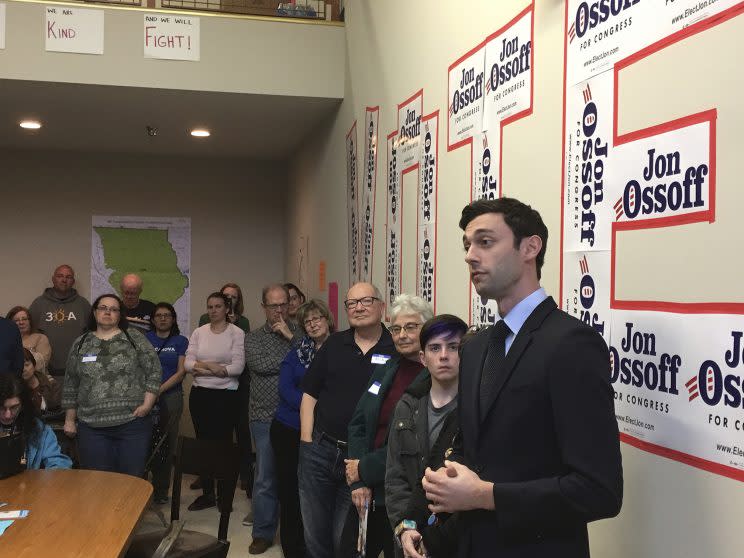Jon Ossoff pulls in record fundraising haul as House special elections heat up

Three special elections this spring to replace members of the U.S. House who became President Trump’s Cabinet secretaries are turning into battlegrounds for Democrats who are itching for a do-over. A race in Georgia has gained national attention, a race on Kansas has unexpectedly tightened and a race in Montana could yet catch fire with national Democrats.
APRIL 18: GEORGIA. In a normal campaign year, a progressive 30-year-old former congressional staffer and documentary filmmaker would not be a serious candidate for a Georgia U.S. House district that’s been occupied by a Republican since the 1970s.
But 2017 is not a normal year, and nothing about Jon Ossoff’s bid for the seat vacated by Republican Tom Price is normal. (Price was named by Trump to be secretary of health and human services.)
As one of the earliest congressional elections since Trump won the White House, Ossoff’s attempt to win the special election in Georgia’s 6th Congressional District has emerged as a colossal battle between the opposition forces Trump’s win unleashed and Republican campaign committees determined to fight back against newly emboldened Democrats with everything they have.
The energy behind Ossoff, who is making his first bid for a congressional seat, is such that he now has succeeded in raising more money in just the first quarter of the year than all but two congressional candidates since 2012: a whopping $8.3 million.
Every recent poll shows Ossoff with a commanding lead in the crowded open primary — which features a slew of Republicans also running — scheduled for April 18. An 11Alive News-SurveyUSA poll shows Ossoff with 43 percent support among likely voters, with the Republicans Karen Handel at 15 percent and Bob Gray at 14 percent. “Polls are just polls. Now, it’s all about turnout,” Ossoff told 11Alive. “Turnout is key, but so, too, is uniting people around our vision for a local economy.”
Ossoff’s best chance of victory would be winning the primary outright, but no polls show him topping 50 percent. Still, polling for likely voter turnout in special elections is notoriously difficult, and the inability of Republicans to offer a candidate whom conservatives can unite behind suggests that enthusiasm on that side of the race may be less than among the highly motivated Democrats rallying around Ossoff. Should he fail to win the race outright, a head-to-head special election with a Republican would be scheduled for June 20.
The danger for Ossoff is that the race is already so nationalized that the early momentum behind him that could have led to an upset victory on April 18 will be blunted by the fiercely negative Republican campaign that’s been launched against him as the national party takes measure to defend the conservative-leaning seat. Republicans have declined to rally behind a candidate of their own, allowing the primary to play out, but they’ve launched a wave of vicious attack ads and mailers, and invested significant money into opposing Ossoff.
“The campaign’s goal is not to get into a runoff, though we’ll be ready to fight a runoff if necessary,” Ossoff has said, according the Atlanta Journal-Constitution. “The campaign’s goal is to win this election outright on April 18.”
APRIL 11: KANSAS While all eyes have been on Georgia, the special election in Kansas that Democrats have largely ignored as a bridge too far is turning out to be closer than expected. Politico reported on Thursday: “The NRCC is pouring money into a last-minute TV ad buy in Kansas ahead of a Tuesday special election, seeking to pump up Republican enthusiasm and turnout in a district that President Donald Trump carried by 27 percentage points just a few months ago.
“The late independent expenditure seeks to boost Republican state Treasurer Ron Estes, who is running to replace CIA Director Mike Pompeo in Kansas’ 4th Congressional District. The district has not been on the radar of most national groups and activists, which have focused on the upcoming special election in Georgia as a more competitive opportunity. But Kansas Republicans are fretting that Estes’s margin is closer than expected in his race against Democrat James Thompson, an attorney.
“‘Kansas should not be in play, but Kansas is in play,’ said one Kansas Republican consultant.”
MAY 25: MONTANA. The race to replace Ryan Zinke, now secretary of the interior, bears watching, reports the Huffington Post, thanks to the emergence of Rob Quist, “the legendary banjo-strumming folk singer with a populist streak and a penchant for public service” as the Democrat in the open contest. The Huffington Post reports:
When Quist arrived last month in Fort Benton, Chouteau County’s biggest town, nearly 70 people gathered to hear him speak.
“We’re a very Republican, red, conservative area,” Bailey told The Huffington Post by phone in a recent interview, describing the first rally they held with Quist in March. “I was like, ‘Holy cow!’”
Now, his rallies regularly draw hundreds. It’s precisely the kind of organizing Democrats say is essential to rebuilding the party and taking back power. But back in Washington, Democrats are conflicted on how or whether to get involved in the race for the House district, which spans the entire state of Montana. Some aren’t following it at all.
So far the powers that be in Washington haven’t really tuned into the race, they report. But there are signs that could change in a state that has a history of electing populist Democrats to statewide offices:
Montana voters will go to the polls on May 25 to choose between Quist and a Republican easily panned as a cartoon plutocrat fresh off a statewide election loss. The president’s approval rating is at 35 percent, and a special-election loss in Montana would be a crushing blow.
… [W]hile the DCCC may be sitting on the sidelines for now, the Democratic National Committee appears to be giving it a much closer look, and plans to send high-profile surrogates there in the coming weeks.




